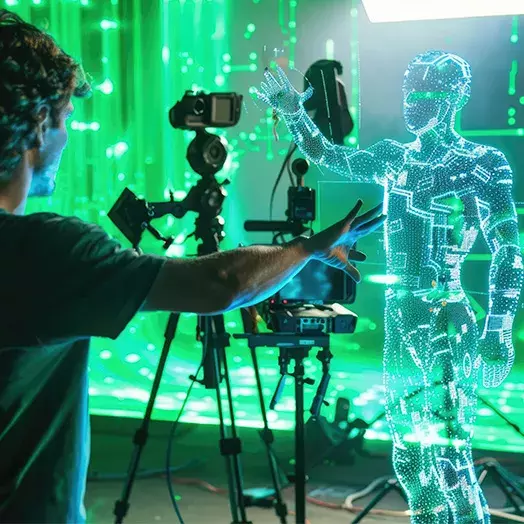Johns Hopkins Carey Business School Professor Stacey Lee says the most successful businesses in the entertainment industry will be those that can harness AI's power while respecting human artists' rights and contributions.

Darth Vader’s voice: Navigating the legal frontier of AI in Hollywood
The entertainment industry is experiencing a seismic shift as artificial intelligence reshapes how we create and consume content. From de-aging actors to replicating iconic voices, AI's prevalence in Hollywood grows daily. However, these technological advancements come with complex legal and ethical challenges that the entertainment industry is currently grappling to address.
AI: A new hope or a phantom menace for the film industry
The recent passing of James Earl Jones, the iconic voice of Darth Vader in the “Star Wars” franchise, shines a light on a pioneering yet controversial move he made in 2022. Jones consented to let Skywalker Sound and Ukrainian company Respeecher use AI to recreate his voice, allowing Darth Vader to live on indefinitely. This technology brought Jones’ artificially created voice to the 2022 "Obi-Wan Kenobi" series on Disney+.
From a business perspective, this decision is brilliant. It allows Disney to continue using one of its most valuable intellectual properties without the constraints of human mortality. However, it also raises concerns about the longevity of actors' careers and the potential devaluation of voice acting as a craft.
This case exemplifies both the opportunities and the challenges that come with AI. While it ensures the continuity of beloved characters, it opens up a Pandora's box of legal and ethical questions. Will more actors follow in Jones' footsteps, or will this practice face resistance?
Labor rights in Hollywood
The 2023 SAG-AFTRA strike brought these concerns to the forefront of industry discussions. At the heart of the strike were demands for protection against the unchecked use of AI in film and television production. The actors' union, which represents approximately 160,000 industry professionals worldwide, sought to establish clear guidelines for the use of digital replicas and to ensure fair compensation for performers whose likenesses might be recreated using AI.
The resolution of the strike resulted in new contractual protections, including requirements for informed consent and compensation for the use of digital replicas. However, recent evidence suggests that implementing these protections comes with challenges. Some actors claim they feel pressured to sign contracts permitting the creation of their digital replicas, highlighting the ongoing tension between technological progress and labor rights.
Resurrecting the dead with AI
Perhaps no case better illustrates the complexities of AI in entertainment than the ongoing lawsuit against Lucasfilm over the digital recreation of Peter Cushing's likeness in "Rogue One: A Star Wars Story." Cushing, who passed away in 1994, was digitally resurrected to reprise his role as Grand Moff Tarkin in the 2016 film.
This case brings to light questions of posthumous rights and the extent to which an actor can control how their likeness is used after their death. Lucasfilm's defense rests on the original contract Cushing signed for “Star Wars” in 1977, arguing that it covers all future uses of his likeness in the franchise. However, the plaintiff, a friend of Cushing's, claims to have the authority to approve or disapprove any recreation of the actor's image based on a 1993 agreement.
This case forces us to grapple with questions of artistic integrity, contractual interpretation, and the evolving nature of intellectual property rights in the digital age. The outcome of this lawsuit could set a significant precedent for using AI to recreate deceased actors, with far-reaching implications for the entertainment business.
Bridging the past and the future
Many people attribute the digital voice we’re all familiar with on our smartphones and navigational devices to inspiration from “Star Trek.” Majel Barrett-Roddenberry, known as the “First Lady of Star Trek," provided the voice for starship computers across multiple of the show’s series. Since her passing, Barrett-Roddenberry’s son has endeavored to preserve and potentially revive his mother’s famous voice.
Roddenberry's vision of using AI to complete his mother's voice catalog and perpetuate her work presents an interesting case study in the preservation of cultural artifacts and the potential positive applications of AI in entertainment. It also raises questions about the nature of performance and authenticity in an age where voices can be synthesized and manipulated with increasing sophistication.
Navigating business implications in uncharted territory
For business leaders in the entertainment industry, these developments present both opportunities and challenges. AI offers unprecedented creative possibilities and potential cost savings. The ability to recreate performances or extend the "life" of valuable intellectual property is undoubtedly attractive from a business standpoint.
However, the legal and ethical challenges posed by these technologies are significant. Companies must navigate a complex web of intellectual property laws, labor agreements, and ethical considerations. The risk of litigation, as seen in the Cushing case, is real and potentially costly.
Moreover, the use of AI in entertainment raises important questions about the value of human creativity and performance. As AI becomes more sophisticated, how do we ensure that human artists and performers are not devalued or replaced? How do we balance the efficiencies offered by AI with the need to protect jobs and preserve the authenticity of artistic expression?
What to Read Next

student experience
Carey drives forward in a changing, AI-driven worldHumans and droids facing the future
The entertainment industry is entering a period of significant change and adaptation. The legal frameworks governing the use of AI in entertainment are still evolving, and we can expect to see more lawsuits, union negotiations, and legislative efforts in the coming years.
For business leaders, the key will be to stay informed, remain flexible, and approach these new technologies with a balance of enthusiasm and caution. The decisions made today about AI and digital recreations will have far-reaching implications for the future of entertainment.
In this evolving landscape, the most successful businesses will be those that can harness AI's power while respecting human artists' rights and contributions. As we move forward in this new era of entertainment, one thing is certain: innovation will continue, but how it unfolds will be a matter of intense debate, negotiation, and strategic decision-making for years to come.
Stacey Lee, JD, joined the Johns Hopkins Carey Business School in 2008. She is a professor in the practice track with expertise in business law, health law, and negotiations. Stacey is the immediate past academic program director for the flagship Full-time MBA program. She also holds a joint appointment at the Bloomberg School of Public Health.
Sources:
Adams, Tim. "Lucasfilm Sued for Recreating Grand Moff Tarkin Actor Peter Cushing’s Image in Rogue One: A Star Wars Story." IGN, Ziff Davis, Sept. 12, 2024, https://www.ign.com/articles/lucasfilm-sued-for-recreating-grand-moff-tarkin-actor-peter-cushings-image-in-rogue-one-a-star-wars-story.
"Actors Strike: SAG-AFTRA’s Fight Against AI, One Year Later." Rolling Stone, Penske Media Corporation, July 14, 2024, https://www.rollingstone.com/tv-movies/tv-movie-features/actors-strike-sag-aftra-ai-one-year-later-1235059882/.
"AI Could Recreate James Earl Jones’ Iconic Darth Vader Voice, Raising Voice Acting Concerns." CBS News, CBS Interactive, Sept. 11, 2024, https://www.cbsnews.com/news/ai-james-earl-jones-star-wars-darth-vader-voice-sag-aftra-voice-acting-concerns/.
Roddenberry, Rod. "Rod Roddenberry on Majel Barrett’s Iconic Role as the Voice of the Star Trek Computer." MovieWeb, April 5, 2022, https://movieweb.com/rod-roddenberry-majel-barrett-roddenberry-computer-voice/.
"Lucasfilm Weighs Leia’s STAR WARS EPISODE IX Role." Nerdist, January 5, 2022, https://archive.nerdist.com/report-lucasfilm-weighs-leias-star-wars-episode-ix-role/.



